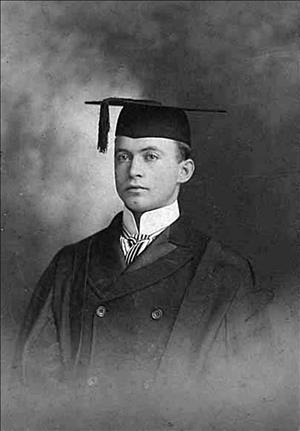For thousands of years, Native Americans preserved their history in a special way. They passed down their traditions and culture to the next generation by means of oral tradition -- or storytelling. After the treaties of the 1850s, Washington tribes were moved on to reservations and Indian children were not allowed to speak their native languages. Important tribal traditions could have been lost forever. The work of dedicated individuals like Arthur C. Ballard helped to collect, translate, and save the histories of many Washington tribes. (This essay was written for students in third and fourth grade who are studying Washington State History and for all beginning readers who want to learn more about Washington. It is one of a set of essays called HistoryLink Elementary, all based on existing HistoryLink essays.)
Collecting Stories
Arthur Ballard's parents were early Washington pioneers. He was born on his family's farm along the White River on October 18, 1876. From a young age, Arthur was very interested in the languages of the Native Americans of the Puget Sound region. By the time he was 15 years old, he had made a list of words (and their meanings) of the Yakama Tribe. He wanted to continue to study language so he went to the University of Washington where he received a degree in Latin.
Ballard became a teacher and wrote articles for the Auburn Globe newspaper. He and his wife Jane were active members of the Auburn community. They donated land so that the city could build the Auburn Carnegie Library and a Methodist Church. Through the years, Ballard stayed very interested in the history of the area -- especially the Native American history. He founded the White River Valley Historical Society in Auburn. In the winter of 1911-1912, he decided that it was necessary to collect and document the tribal traditions of the local Indians before it was too late. He felt that with his education and interest, he was just the person to do it.
Ballard learned of a Native elder named Sukwa'lasxt and sometimes called Big John by people who could not pronounce his name. Sukwa'lasxt lived on the nearby Muckleshoot Reservation. But when he and Ballard tried to talk, they could not understand each other. Ballard knew that he would need to find someone who could help translate what was being asked and what was being said. Ballard was introduced to John Xot (Hote). Together the two men began to visit reservations to listen to the stories that had been passed down from generation to generation. Using a special alphabet, Ballard was able to carefully preserve original Indian words. This allowed him to save the legends of many different Native American groups and tribes. He is known as a leading expert on Puget Sound tribes and traditions.
The salmon was traditionally very important to the Native Americans of the Puget Sound region. It was their primary food source, and they traded salmon for other things that they needed or wanted. The first salmon caught each year was treated carefully and prepared and eaten in a special way so that the salmon would be sure to return the next year. Many of the legends of these First People include salmon.
In the stories, the salmon can often talk and help the people solve problems. The stories teach people how to behave correctly so that there will continue to be plenty of fish. Some stories tell people how to make the spirit world happy so that it will continue to help them.
In the "Humpback Salmon" legend, the fish wants to come back up the river to die because this is what salmon do. He is afraid that he will be made fun of because of the hump in his back and because people will think he is swimming the wrong way. He warns that if people laugh at him, he will bring sickness to the people.
Other legends tell how certain landforms like Snoqualmie Falls or the Tolt River were created. One describes why the rocks in the Duwamish River called the North Wind Weir have that name.
Vi Hilbert, who was a member of the Upper Skagit tribe, is well-known for preserving the Lushootseed language and stories. Hilbert learned to speak Lushootseed as a child as she was listening to her parents' conversations. It was not until she was an adult, though, that she learned to read and write in this language. She became a teacher at the University of Washington and taught Lushootseed to hundreds of students. She hoped that by doing this she would inspire others to continue to preserve the language, stories, traditions, and culture of the Coast Salish people.

